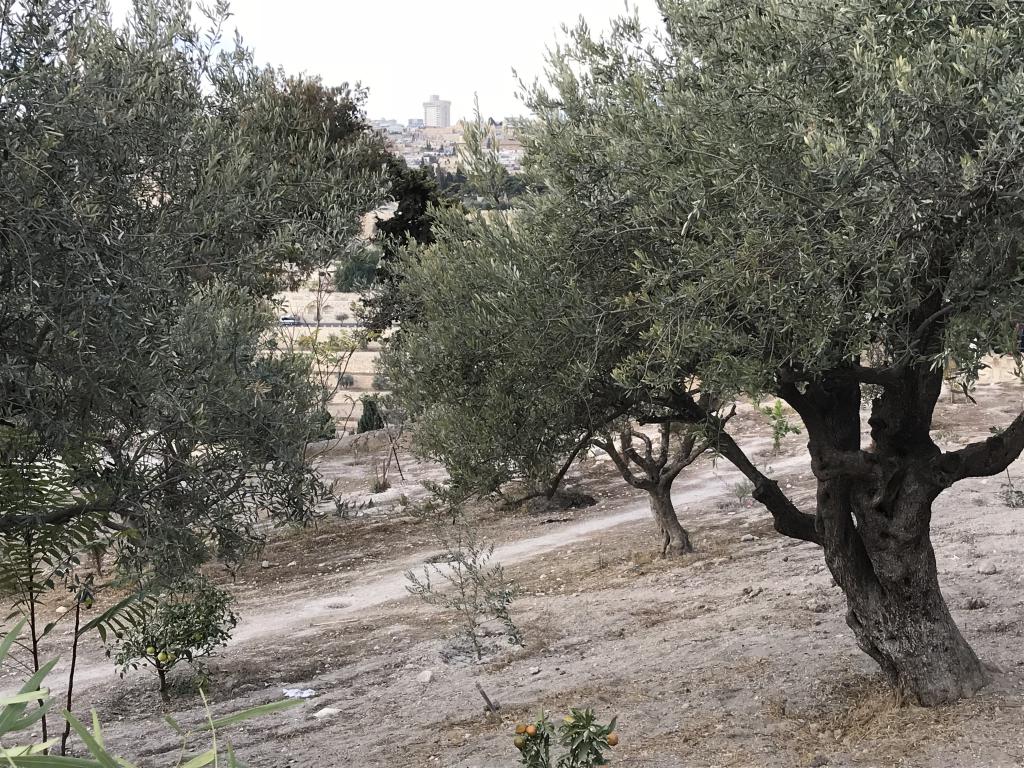Bishop John writes:
The day began with a visit to Archbishop Pizzaballa, the Apostolic Administrator of Jerusalem at the Latin Patriarchate, to convey greetings from Cardinal Vincent and the pilgrims. An informative conversation about the Church in the Patriarchate followed. I then joined the pilgrims at the Pater Noster Church where Fr John Farrell spoke about the need for the rhythm of prayer in daily life and the way in which the practice of prayer leads to prayerfulness. We pray ‘Our Father’, and need to think about the meaning of OUR which includes all Christians. Pilgrims were delighted to find the words of the Our Father in various languages including Sinhalese and Tamil. Fr John then focused on the day ahead and the ways in which we would experience the contrast between the Price of Peace born in Bethlehem and the violence associated with Jerusalem, both towards the prophets and towards Christ.
We began our descent of the Mount of Olives and paused at the Chapel of Dominus Fleet. Jesus wept tears over Jerusalem and we were invited to lament and recognise the effects of sin both personal and structural: selfishness, arrogance, greed, avarice, lust as well as injustice, oppression, hypocrisy and lies, the taking of innocent life, and exploitation. As Jesus wept, Christians weep today.

We continued down the Mount of Olives to the Garden of Gethsemane. The mood was sombre and reflective. If the ancient olive trees could speak, they would tell the story of violence and suffering. Maybe one of them had seen Jesus in the Garden and witnessed his agony of prayer and the sleepiness of the apostles. We celebrated Mass in the Grotto of Gethsemane. In his powerful sermon, Fr John focused on the agony of Jesus who suffered for the sins of all people. He knew the suffering of loneliness, anguish, abuse, and exploitation but loved each of his oppressors so as to overcome the violence. As he yielded up his freedom, he did the Father's will. His love covered their sins and redeemed the human race so that a new life in Christ might be assumed. Fr John spoke of the violence which is suffered by men and women and for which we must weep tears as Jesus wept. Jesus offered his pain and suffering to the Father who accepted it and was merciful. In the Mass we united ourselves again with the once-and-forever sacrifice of Christ on the Cross and offered our prayers to the one Mediator, Jesus Christ, who alone can save us. God’s Holy People, through their priest, make the offering to the One who can save them.
Lunch was another highlight of the day and an opportunity to talk over the events of the day.
After lunch, we travelled to Mount Sion to visit the Church of the Dormition where Fr John discussed the meaning of the Assumption or Dormition of Mary. Onwards we walked to the Cenacle where we remembered the Last Supper and the commandment of Jesus that his followers must wash each other’s feet in service and love. Then to the Church of St Peter in Gallicantu, where we prayed Psalm 88 in the dungeon where Christ spent the night of Holy Thursday before being brought before Pontius Pilate. Having entered into the Passion of Christ, we then walked to the Western Wall and offered our prayers with the Jewish people who prayed there and wailed for the destruction of the Temple: a most holy place.
As today we pondered the mysteries of Christ's Passion, the mood was quiet and prayerful. The events were too great to grasp and comprehend. We walked by faith and tried to find some understanding. How hard it is to grasp the fullness and depth of the love with which Christ has loved his people?

Tonight with packing and organisation, we prepare to travel home. Our minds must shift to thinking about the meaning of this pilgrimage for the events and days ahead as we live out our calling as missionary disciples of Christ. Above all tonight, we can be grateful and thank God for the blessings of the pilgrimage.




